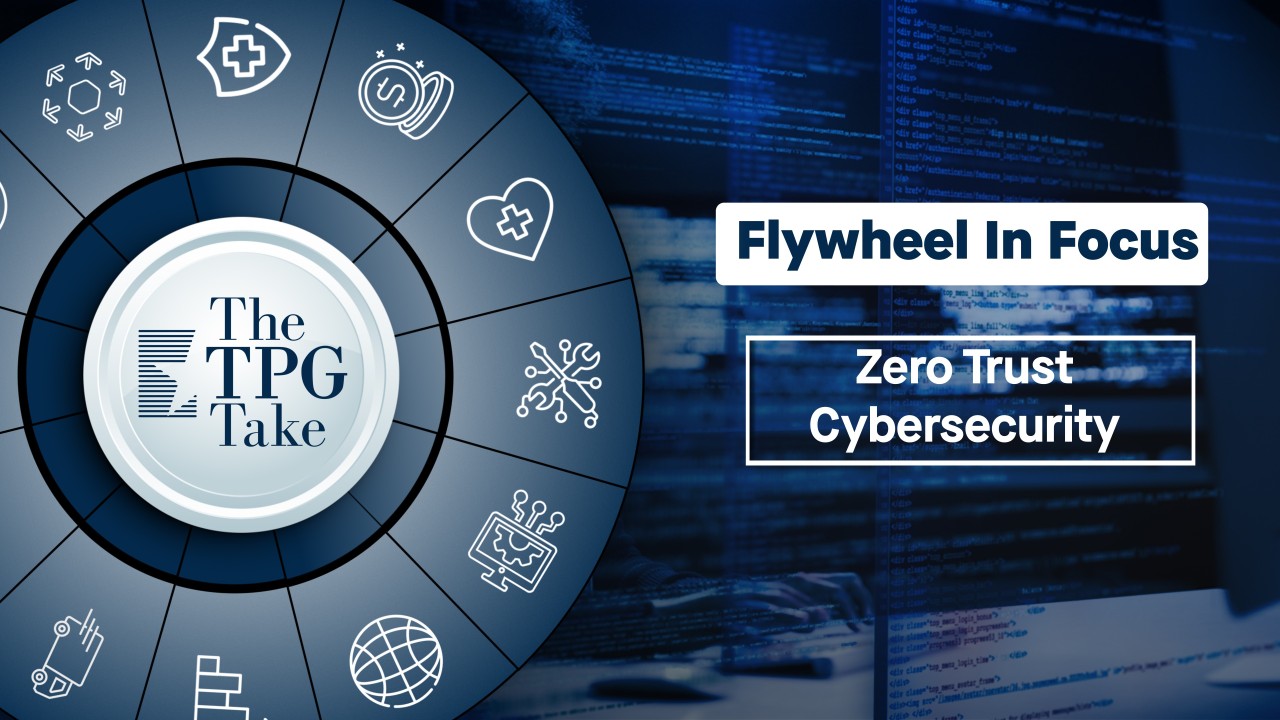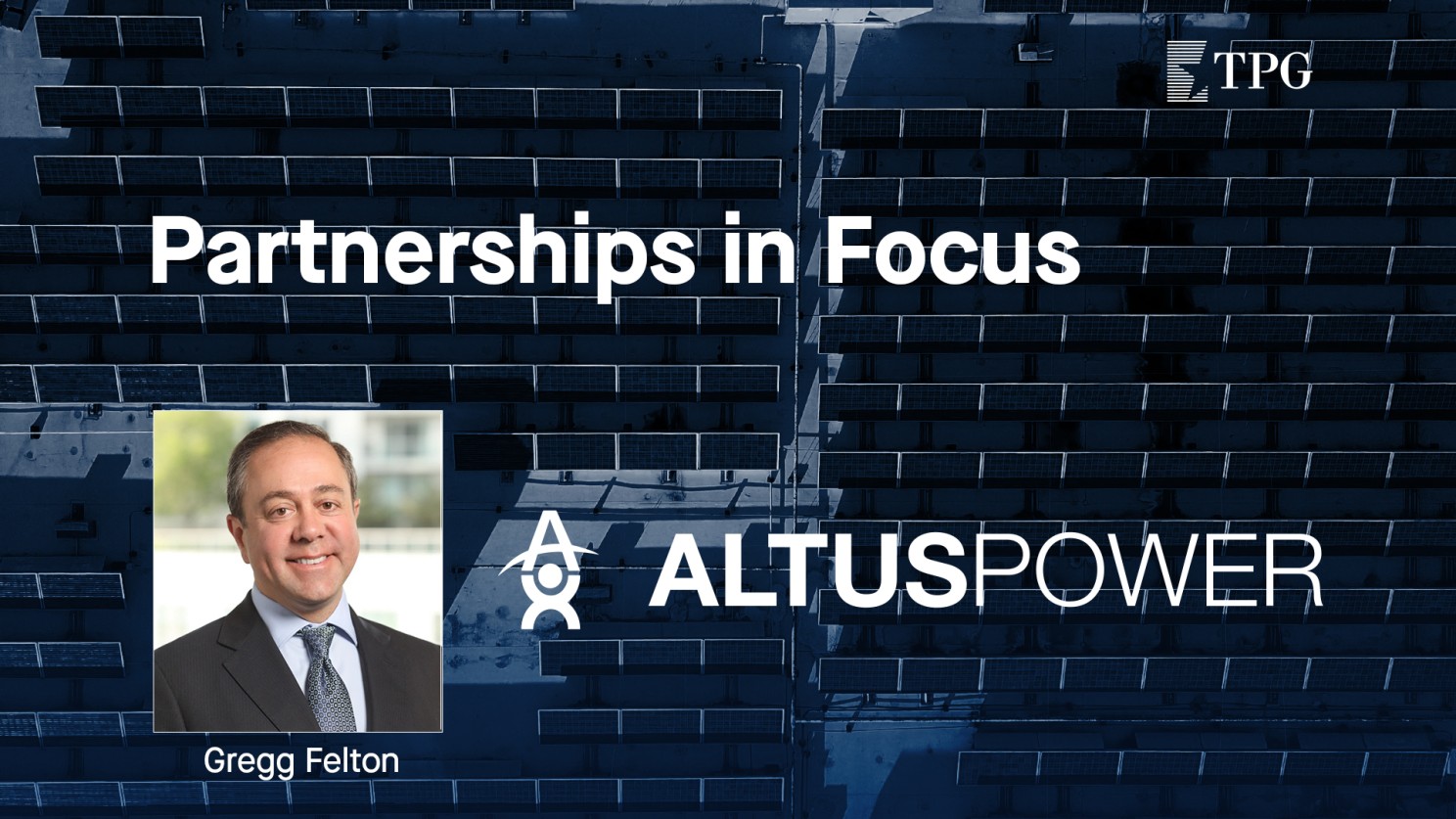
October 2025, Issue #15
Flywheel in Focus: Investing Behind Zero Trust Cybersecurity
In this edition of The TPG Take x Flywheel in Focus, leaders from TPG’s software and enterprise technology group discuss the investment opportunities shaping the future of cybersecurity.
Explore how zero trust, artificial intelligence, and global resilience trends are driving transformation across the sector—and how TPG’s cross-platform, growth-oriented approach is shaping resilient, next-generation cybersecurity businesses that protect and enable enterprises, governments, and critical infrastructure.
Note: the below is an edited transcript of interviews with leaders across the firm. For more, please be sure to watch the full videos.
Defining Zero Trust Cybersecurity
Tim Millikin: "For better or worse, we're going to continue to see advancements on the threat side of things from increasing speed, sophistication, breadth, and, unfortunately, severity in terms of cost of each of these breaches. And so, that's going to continue to power growth in this industry. What we're looking for are security solutions that not only stay ahead of the curve in terms of where those threats are coming from, but also serve our customers in a way that enables them to still operate their business quickly and efficiently.
The concept of Zero Trust is about using security technologies to protect and defend at every step of the way from your network, to every time an application is open, to protecting your data, users, and individuals. And that concept has really led to massive growth in the overall security market, but also an increased specialization."
Nehal Raj: "Zero Trust assumes that someone has already breached the perimeter, and is inside the walls of the enterprise. Over the last 10 or 15 years, work has become much more mobile, causing that perimeter to become more difficult to protect. Additionally, a lot of the work that we do is no longer on premise, but is in the cloud, which has caused a re-tooling or re-architecture of the security technology landscape and it's creating a lot of new areas to focus on. And that's really good as an investor because it's creating new companies, new technologies, and new opportunities to invest."
Cybersecurity Trends: The Impact of Artificial Intelligence
Tim: "The security market protects IT infrastructure, and so, as IT infrastructure moves and evolves, that opens up new security paradigms. AI is just another layer in the layer cake, but it's also a wrapper, meaning it's going to impact every component of security. Additionally, think about protecting the AI itself, so protecting against how bad actors are using AI-based tools to accelerate and increase the velocity and magnitude of these impacts is going to be really powerful."
Mike Zappert: "Many of our portfolio companies have been in the early waves of the AI trend. Onfido, for example, is a company that uses AI to effectively understand whether you are who you say you are based on your government-issued ID, which is a solution that you couldn't do through traditional, manual coding. We've also had companies like Expanse in the security space, which has been very successful in identifying and understanding anomalies in your network that you couldn't otherwise understand."
Robert Roley: "Another example would be Delinea, a cybersecurity company which has identified several areas where they can take advantage of preexisting, proven AI-based use cases to make the firm run more effectively. They're adding a lot of AI-driven authorization capabilities, which is creating competitive differentiation for them in the market. Finally, they're implementing ways to take advantage of AI and change the way that they interface with their customers."
Cybersecurity Trends: Global Resilience
Tim: "Another megatrend that we're watching is around global resilience. The reality is a lot of the security problems in the world come from global conflict and nation-state activity, which is only getting more complicated in our geopolitics today. Think about water, power, utility, infrastructure – these old, hard industries that have not been modernized, but are increasingly coming online in the face of geopolitical activity. There’s going to be an opportunity to serve that market better.
We're backing a company called Everfox, which is serving global governments and critical infrastructure with their unique security requirements. That's an incredibly important theme that's growing in need and complexity, and the need for specialized solutions that target just that market alone is, we think, going to be a trend that gets powered over the next decade. And Everfox is the leader within that space."
Flywheel in Focus: Cybersecurity
Mike: "We're all part of one software and enterprise technology group. Our flexible mandate, shared teams and shared themes, allows us to work across the different pools of capital where we have great relationships and gives us the ability to add value over time. You get to see the power of the platform and share insights across the different stages of the company lifecycle."
Tim: "For us in tech, the flywheel that really gets working is the flywheel between our platforms. That's being able to look at early-stage trends and companies on the forefront of innovation, and getting in with them early. That helps inform our large-cap buyout business where we're thinking about how to build strong companies, reinforce market leadership, and actually find the right technologies to go acquire to build these businesses stronger. And those learnings and insights just keep repeating."
Nehal: "Our first investment in the space was out of TPG Growth, a company called Zscaler, which was oriented around cloud-oriented security. That led us directly to make a very large investment into a company called McAfee that does antivirus software for enterprises and consumers. Our thesis was that no company actually removes the base layer of the security, rather they just keep building more security on top, and, as a result, you don't want any holes in that architecture. So, what we saw was there's actually a lot of staying power in that base layer, and it's really the new technologies that will be added on top."
Partnerships in Focus – Navigating the Cybersecurity Landscape
Peter Leav: "I was the CEO of McAfee, which was a TPG portfolio company prior to exiting. At McAfee, we had a need for a transformation. We IPO'd the business, we divested a business, and we ultimately sold the business all in a very short period of time. And TPG was masterful in helping think through those things strategically.
As our team was working diligently to compete in this very crowded market, TPG treated us as partners, and we felt as though we had trust and alignment. But importantly, they brought value to us and to the business, which was a big part of why we were able to function and move as quickly as we did."
Art Gilliland: "I'm the CEO of Delinea, a cybersecurity business focused on identity security. Primarily what we're doing is trying to protect your assets or our company's assets from people that want to steal it. As more of our lives move digital, crime is following it into the digital world, and so our technology just becomes more relevant.
If you look at security in general, in the past it's been very system-centric – I own the server or the network, and I put security in it. But now in a world where you are renting applications and infrastructure, you don't own any of those security controls, but you're still responsible. And so, for the next decade, I think the places that are going to have the most interesting innovations and the highest value are places where you can actually put the controls, and that's going to be on the user, their identity, and what access they have to that data. And so what we do is all about managing the privileges of the user.
We're actually the merger of two companies, so the beginning of Delinea was transformation, integration, and a lot of work. And TPG really shows up as a partner and is thoughtful about helping you think through that and working through the challenges."
Sean Berg: "I'm the CEO of Everfox, the leading provider of trusted, high-assurance cybersecurity technology that supports governments and critical infrastructures across the globe. Our mission is to support our customers, especially in supporting national security, so our technology is a key enabler for them to be able to do business.
We are growing not only within our core business, but also bringing in new capabilities to support the emerging challenges that our customers face. Our biggest opportunity around AI is how we protect it for our customers. So if you think about how governments and critical infrastructures are going to leverage AI, they'll be building big data lakes to train their own models on. So how are they going to move information into and protect these secure enclaves to be able to process and and identify information? That is exactly what we do.
We were a carve-out, meaning we had to build out our IT Infrastructure, HR, and C-suite. We also had to think through our long-term strategy and how that's going to evolve over time to include organic and inorganic growth. The partnership with TPG and who they were able to bring into those discussions was unique and hugely beneficial."
TPG’s Differentiated Approach to Cybersecurity
Tim: "Cyber is an exciting market, but it's also a really difficult market to get right. The market moves quickly and is highly technical. And so we have been embedding and infusing that DNA from being close with our disruptors from our partnership with our growth equity platform, using our position in Silicon Valley where we have an advisory network of security professionals and entrepreneurs, and leveraging our deep expertise within our own broader TPG platform where we have a scaled portfolio company set of users of these technologies. And, altogether, bringing those insights back in to our investment community allows us to develop really deep perspectives. I think that what we can put together across all those pieces is pretty much unlike any other large-cap private equity firm."
Nehal: "Our investment approach is centered around what we call growth-oriented transformations. What that really means is we invest in growing companies in growing end markets. Then, we like to invest in companies where we can drive transformational, positive change. And so, that's where we get most excited – where we see a market that has a lot of growth to it, and a company that can benefit from our guidance and leadership."
ICYMI: Other News & Views from TPG...
In this episode of Partnerships in Focus, we sit down with Gregg Felton, Founder & CEO of Altus Power, who discusses how the partnership with TPG Rise Climate Transition Infrastructure is accelerating growth and supporting their mission to deliver commercial-scale, clean electric power under a backdrop of increasing energy needs.

Thank you to all of our followers and readers for joining us for another edition of The TPG Take. Please share the newsletter with anyone you think would be interested and we look forward to being back in your inboxes.

TPG
345 California St suite 3300, San Francisco, CA 94104, USA
Important Disclosures
This material is solely for informational purposes and shall not constitute an offer to sell or the solicitation to buy securities. The opinions expressed herein represent the current, good faith personal views of the author(s) at the time of publication, and do not necessarily represent the views of TPG, its affiliates, or any of its investment professionals. The opinions expressed herein are not definitive investment advice and should not be relied on as such. The information presented herein has been developed internally and/or obtained from sources believed to be reliable; however, TPG does not guarantee the accuracy or completeness of such information. We provide links to third party websites only as a convenience and the inclusion of such links does not imply any endorsement, approval, investigation, verification or monitoring by us of any content or information contained within or accessible from the linked sites. If you choose to visit the linked sites you do so at your own risk, and you will be subject to such sites' terms of use and privacy policies, over which TPG has no control. In no event will TPG be responsible for any information or content within the linked sites or your use of the linked sites. Predictions, opinions, and other information contained in this material are subject to change continually and without notice of any kind and may no longer be true after the date indicated. Any forward-looking statements speak only as of the date they are made, and TPG assumes no duty to and does not undertake to update forward-looking statements. Forward-looking statements are subject to numerous assumptions, risks and uncertainties, which change over time. Actual results could differ materially from those anticipated in forward-looking statements.
